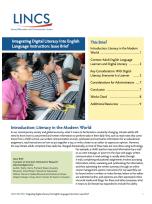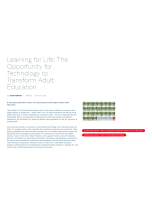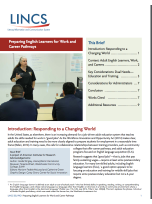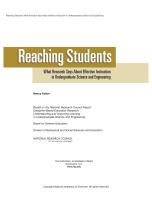Adult Education & Literacy Resource Collection
Explore a collection of 748 high-quality multimedia instructional resources, informed by research, for use by adult educators. These resources have been reviewed by subject matter experts and recommended and approved by the U.S. Department of Education, Office of Career, Technical, and Adult Education (OCTAE), Division of Adult Education and Literacy. Search the collection by category, keyword, date and more.
-
Integrating Digital Literacy Into English Language Instruction: Issue Brief
2015
This issue brief, one of the resources in the suite of materials “Integrating Digital Literacy into English Language Instruction,” presents a broad overview of digital literacy as it relates to adult learners in English language acquisition programs.
Administrators and Program Managers
Adult Educators
Policymakers
Professional Developers
State Leaders
-
-
New Models for Distance Classes in Adult Education
2015
This guide describes the classes of a number of distance education teachers who have adjusted their courses to incorporate college and career ready skills, enriching the online experience for students.
Administrators and Program Managers
Adult Educators
-
Preparing English Learners for Work and Career Pathways: Issue Brief
2015
This issue brief, one of the resources in the suite of materials “Preparing English Learners for Work and Career,” provides teachers and administrators with an overview of current research and practice related to connecting English language acquisition to career pathways.
Administrators and Program Managers
Professional Developers
Policymakers
Adult Educators
State Leaders
-
-
-
From College to Careers: Fostering Inclusion of Persons with Disabilities in STEM
2014
From College to Careers: Fostering Inclusion of Persons with Disabilities in STEM is the product of a collaborative project initiated to examine current issues and explore future directions for improving the academic success and career entry rate of postsecondary students with disabilities (SWDs) in the science, technology, engineering, and mathematics (STEM) fields.
Administrators and Program Managers
Adult Educators
Policymakers
Professional Developers
State Leaders






